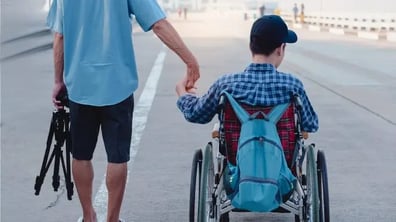Severe combined immunodeficiency (SCID) is exceedingly rare—about 1 in every 58,000 live births1—yet it carries an outsized clinical urgency. Early hematopoietic stem-cell transplant (HCT) can push 5-year survival above 90 percent, but every delay erodes that advantage.2 In that reality, the timeline from first contact to first dose matters as much as the therapy itself.
Our sponsor’s Phase 1-2 study evaluated a synthetic small-molecule conditioning agent used immediately before HCT. The goal: achieve reliable engraftment and durable immune reconstitution in newly diagnosed SCID infants—while parents were still confronting a life-threatening diagnosis during a global pandemic.
|
Therapeutic Area |
Autoimmune |
|
Indication |
Severe Combined Immunodeficiency (SCID) |
|
Phase |
1-2 safety, efficacy |
|
Segment |
Pediatric |
|
Sites |
>10 Sites, USA-only |
|
Design |
Hematopoietic Cell Transplantation Conditioning to |
The SCID Clinical Trial Challenge
In our sponsor’s Phase 1-2 pediatric study, a synthetic small-molecule conditioning agent was evaluated for its ability to prepare infants for HCT and durable immune reconstitution. Three obstacles stood out:
- Intense competition for the same patients. U.S. transplant centers often pursue identical referral lists within days of diagnosis.
- High caregiver burden. SCID families face cross-country travel, multi-day hospital visits, and navigating insurance during a crisis.
- COVID-era disruption. Clinic capacity limits and travel restrictions threatened to derail already tight transplant windows.
-

Rare Diseases - Clinical Trials - Clinical Trial Strategy
Rare Disease Clinical Trials in Pediatric Populations: Lessons Learned
- |
Patient-Centric Clinical Trial Design
Sponsor–Advocacy Collaboration
Working with national SCID advocacy groups, the study team hosted virtual lunch-and-learn sessions for frontline immunologists and genetic counselors. Quick-reference pamphlets and two-minute caregiver videos simplified the study’s purpose, schedule, and support resources.
Educational Materials Boost Literacy
Animated explainer videos (available in English and Spanish) walked parents through conditioning, engraftment, and follow-up requirements, helping them make fully informed decisions despite the emotional shock of diagnosis.
Travel Policy & Reimbursement
A sponsor-funded travel policy covered flights, lodging, and meals for caregivers. Reimbursements were processed directly through sites, eliminating out-of-pocket strain and reducing last-minute cancellations.
-

Regulatory - Clinical Trials - Translational Research
Conducting Pediatric Studies: Addressing Ethical and Clinical Challenges
- |
Operational Flexibility in Hematopoietic Cell-Transplant Conditioning
Telehealth Offsets COVID-19 Constraints
When local rules limited in-person consults, qualifying visits moved to secure video calls. Labs and imaging were scheduled at satellite facilities, and results were uploaded to the EDC within 24 hours.
Flexible Visit Windows
Protocol-defined visit windows were widened—where medically appropriate—to ±48 hours, letting families synchronize travel with hospital bed availability and airline schedules without jeopardizing dose timing.
Site Partnerships
Sites with pediatric HCT expertise received central budget and CTA templates, shortening negotiations and freeing coordinators to focus on caregiver coaching rather than paperwork.
What Sponsors Can Take Away from This SCID Clinical Trial
Advocacy Alignment Accelerates Awareness & Trust
- Co-branded materials and webinars turned advocacy leaders into study ambassadors, ensuring that newly diagnosed families heard a single, reassuring message rather than competing pitches.
- Telehealth options and expanded visit windows preserved protocol integrity, proving that rare-disease trials can remain resilient when global events threaten access.
- Travel reimbursements and clear educational touchpoints kept enrollment steady—even when local COVID-19 spikes forced abrupt schedule changes.
Global Rare Disease Clinical Trial Services
Ultra-rare doesn’t have to mean ultra-slow. Learn how our rare-disease trial services combine advocacy alignment, caregiver-centric logistics, and site-startup precision to keep life-saving studies on track.
-
Explore

Rare Disease CRO Services
ExploreAcross the spectrum of rare and orphan diseases, including ultra-rare indications, Precision for Medicine excels at providing rarefied solutions to solve the most complex of challenges.Rare Disease CRO Services
ExploreAcross the spectrum of rare and orphan diseases, including ultra-rare indications, Precision for Medicine excels at providing rarefied solutions to solve the most complex of challenges. -
Explore

Oncology CRO Services
ExploreExpedite your targeted oncology therapy with a CRO rooted in developing novel therapies and delivering commercial success.Oncology CRO Services
ExploreExpedite your targeted oncology therapy with a CRO rooted in developing novel therapies and delivering commercial success. -
Explore

Speak with an Expert
ExploreReady to plan your upcoming program or project? Reach out to our team and we will put you in contact with the right person.Speak with an Expert
ExploreReady to plan your upcoming program or project? Reach out to our team and we will put you in contact with the right person.
References
- Justiz Vaillant AA, Mohseni M. Severe Combined Immunodeficiency. [Updated 2023 Aug 8]. In: StatPearls [Internet]. Treasure Island (FL): StatPearls Publishing; 2025 Jan. Available from: https://www.ncbi.nlm.nih.gov/books/NBK539762/
-
Heimall J, Cowan MJ. Long term outcomes of severe combined immunodeficiency: therapy implications. Expert Rev Clin Immunol. 2017;13(11):1029-1040. doi:10.1080/1744666X.2017.1381558





